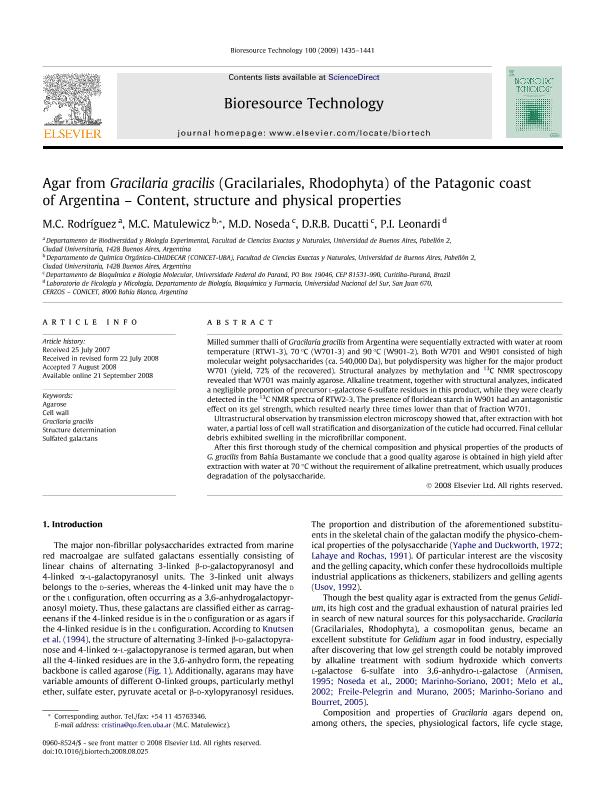Mostrar el registro sencillo del ítem
dc.contributor.author
Rodríguez, María Cecilia

dc.contributor.author
Matulewicz, Maria Cristina

dc.contributor.author
Noseda, M. D.
dc.contributor.author
Ducatti, D. R. B.
dc.contributor.author
Leonardi, Patricia Ines

dc.date.available
2017-10-09T18:49:04Z
dc.date.issued
2009-02
dc.identifier.citation
Rodríguez, María Cecilia; Matulewicz, Maria Cristina; Noseda, M. D.; Ducatti, D. R. B.; Leonardi, Patricia Ines; Agar from Gracilaria gracilis (Gracilariales, Rhodophyta) of the Patagonic coast of Argentina-Content, structure and physical properties; Elsevier; Bioresource Technology; 100; 3; 2-2009; 1435-1441
dc.identifier.issn
0960-8524
dc.identifier.uri
http://hdl.handle.net/11336/26245
dc.description.abstract
Milled summer thalli of Gracilaria gracilis from Argentina were sequentially extracted with water at room temperature (RTW1-3), 70 C (W701-3) and 90 C (W901-2). Both W701 and W901 consisted of high molecular weight polysaccharides (ca. 540,000 Da), but polydispersity was higher for the major product W701 (yield, 72% of the recovered). Structural analyzes by methylation and 13C NMR spectroscopy revealed that W701 was mainly agarose. Alkaline treatment, together with structural analyzes, indicated a negligible proportion of precursor L-galactose 6-sulfate residues in this product, while they were clearly detected in the 13C NMR spectra of RTW2-3. The presence of floridean starch in W901 had an antagonistic effect on its gel strength, which resulted nearly three times lower than that of fraction W701. Ultrastructural observation by transmission electron microscopy showed that, after extraction with hot water, a partial loss of cell wall stratification and disorganization of the cuticle had occurred. Final cellular debris exhibited swelling in the microfibrillar component. After this first thorough study of the chemical composition and physical properties of the products of G. gracilis from Bahía Bustamante we conclude that a good quality agarose is obtained in high yield after extraction with water at 70 C without the requirement of alkaline pretreatment, which usually produces degradation of the polysaccharide.
dc.format
application/pdf
dc.language.iso
eng
dc.publisher
Elsevier

dc.rights
info:eu-repo/semantics/openAccess
dc.rights.uri
https://creativecommons.org/licenses/by-nc-sa/2.5/ar/
dc.subject
Agarose
dc.subject
Cell Wall
dc.subject
Gracilaria Gracilis
dc.subject
Structure Determination
dc.subject
Sulfated Galactans
dc.subject.classification
Otras Ciencias Químicas

dc.subject.classification
Ciencias Químicas

dc.subject.classification
CIENCIAS NATURALES Y EXACTAS

dc.title
Agar from Gracilaria gracilis (Gracilariales, Rhodophyta) of the Patagonic coast of Argentina-Content, structure and physical properties
dc.type
info:eu-repo/semantics/article
dc.type
info:ar-repo/semantics/artículo
dc.type
info:eu-repo/semantics/publishedVersion
dc.date.updated
2017-10-09T15:33:27Z
dc.journal.volume
100
dc.journal.number
3
dc.journal.pagination
1435-1441
dc.journal.pais
Países Bajos

dc.journal.ciudad
Amsterdam
dc.description.fil
Fil: Rodríguez, María Cecilia. Universidad de Buenos Aires. Facultad de Ciencias Exactas y Naturales. Departamento de Biodiversidad y Biología Experimental; Argentina
dc.description.fil
Fil: Matulewicz, Maria Cristina. Consejo Nacional de Investigaciones Científicas y Técnicas. Oficina de Coordinación Administrativa Ciudad Universitaria. Centro de Investigaciones en Hidratos de Carbono. Universidad de Buenos Aires. Facultad de Ciencias Exactas y Naturales. Centro de Investigaciones en Hidratos de Carbono; Argentina
dc.description.fil
Fil: Noseda, M. D.. Universidade Federal do Paraná; Brasil
dc.description.fil
Fil: Ducatti, D. R. B.. Universidade Federal do Paraná; Brasil
dc.description.fil
Fil: Leonardi, Patricia Ines. Consejo Nacional de Investigaciones Científicas y Técnicas. Centro Científico Tecnológico Conicet - Bahía Blanca. Centro de Recursos Naturales Renovables de la Zona Semiárida. Universidad Nacional del Sur. Centro de Recursos Naturales Renovables de la Zona Semiárida; Argentina
dc.journal.title
Bioresource Technology

dc.relation.alternativeid
info:eu-repo/semantics/altIdentifier/doi/http://dx.doi.org/10.1016/j.biortech.2008.08.025
dc.relation.alternativeid
info:eu-repo/semantics/altIdentifier/url/http://www.sciencedirect.com/science/article/pii/S0960852408007256
Archivos asociados
